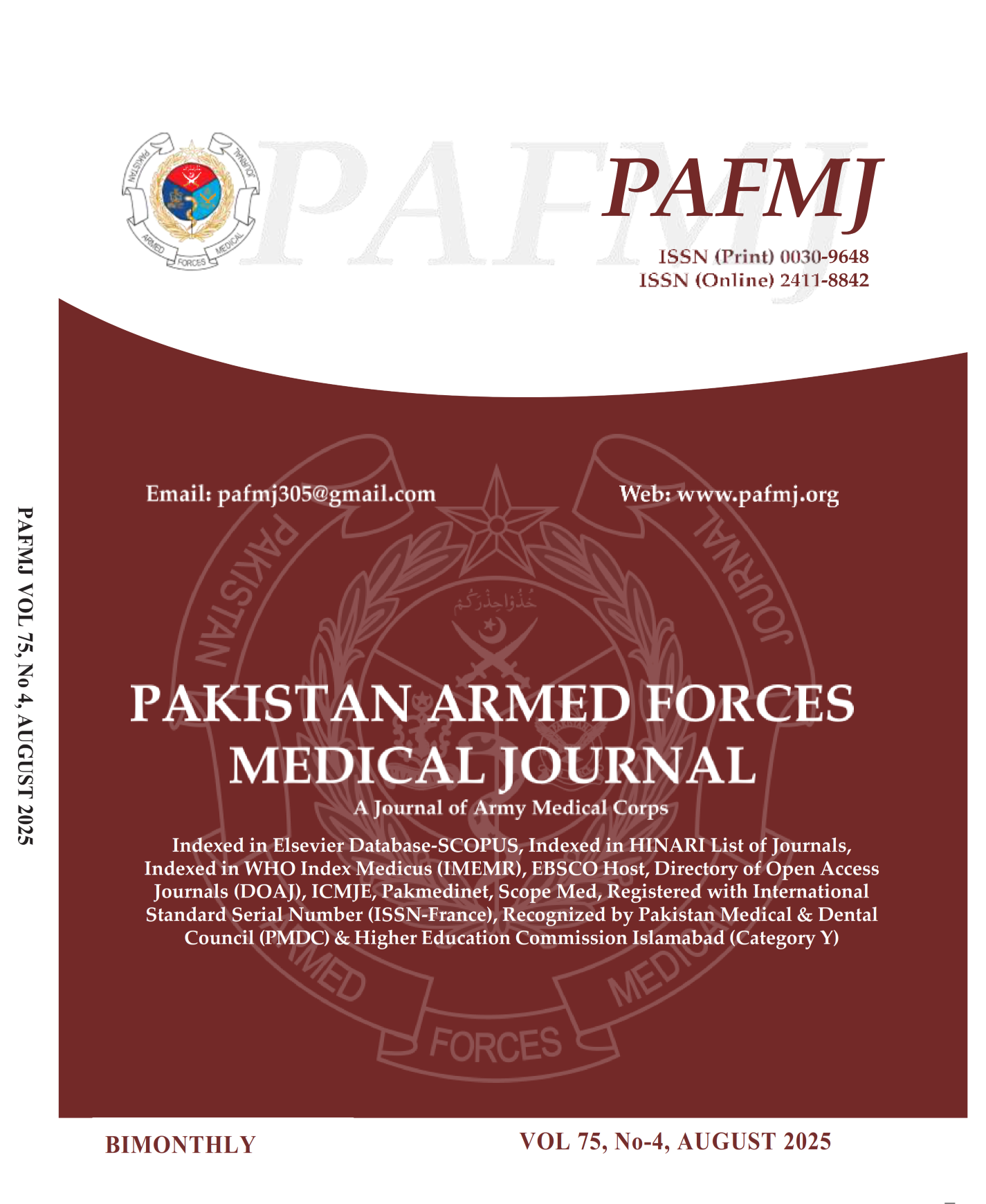Cross-Sectional Analysis of Immunohistochemical Expression of Mismatch Repair Proteins in Prostate Cancer
DOI:
https://doi.org/10.51253/pafmj.v75i4.10310Keywords:
Immunohistochemical Expression, Microsatellite Instability (MSI), Mismatch Repair (MMR) Deficiency, MSH-2, MSH-6, MLH-1, PMS-2, Prostatic CarcinomaAbstract
Objective: To determine the immunohistochemistry-based frequency of mismatch repair protein (MSH-2, MSH-6, MLH-1 & PMS-2) deficiency in prostate cancer.
Study Design: Cross-sectional study.
Place and Duration of Study: Department of Histopathology, Armed Forces Institute of Pathology, Rawalpindi Pakistan, from Jan 2021 to Jul 2022.
Methodology: The characteristics and clinical data of 82 prostatic cancer patients who had transurethral resection of the prostate and surgical resections were examined. MLH-1, MSH-2, PMS-2, and MSH-6 antibodies were utilized during immune-histochemical staining. The status of each patient's mismatch repair deficit was established once the results were assessed.
Results: In the study, mean age of presentation was 70.90±8.36 years. Most common histological type was acinar adenocarcinoma, 67(81.70%). Out of 82 patients with prostatic carcinoma, 17(20.73%) patients had lost their immunohistochemistry staining for MMR proteins. Nonetheless, no mismatch repair deficit was found in the 65(79.27%) remaining instances. One patient had a simultaneous loss of all four antibodies, two had loss of MLH-1, three had loss of MSH-2, eleven had loss of PMS-2, and twelve had loss of MSH-6.
Conclusion: The frequency of mismatch repair deficiency in our community's prostate cancer patients was reported to be 34.1%, which may be utilized as a base for genetic testing to track the effectiveness of treatment and forecast the overall survival rate for patients with prostate cancer. Studies are also needed to explain the MMR protein’s genetic role in cancer formation, together with the signaling pathway.
Downloads
References
1. Siegel RL, Miller KD, Jemal A. Cancer statistics, 2019. CA Cancer J Clin 2019; 69(1): 7-34. https://doi:10.3322/caac.21551
2. Bray F, Ferlay J, Soerjomataram I, Siegel RL, Torre LA, Jemal A. Global cancer statistics 2018: GLOBOCAN estimates of incidence and mortality worldwide for 36 cancers in 185 countries. CA Cancer J Clin 2018; 68(6): 394-424.
https://doi:10.3322/caac.21492
3. Bugoye FC, Torrorey-Sawe R, Biegon R, Dharsee N, Mafumiko FMS, Patel K, et al. Mutational spectrum of DNA damage and mismatch repair genes in prostate cancer. Front Genet 2023; 14: 1231536. https://doi:10.3389/fgene.2023.1231536
4. Mahmood S, Qasmi G, Ahmed A, Kokab F, Zahid MF, Afridi MI, et al. Lifestyle factors associated with the risk of prostate cancer among Pakistani men. J Ayub Med Coll Abbottabad 2012; 24(2): 111-115.
5. VVan den Broeck T, van den Bergh RCN, Arfi N, Gross T, Moris L, Briers E, et al. Prognostic Value of Biochemical Recurrence Following Treatment with Curative Intent for Prostate Cancer: A Systematic Review. Eur Urol 2019; 75(6): 967-987. https://doi:10.1016/j.eururo.2018.10.011
6. Ferro M, de Cobelli O, Vartolomei MD, Lucarelli G, Crocetto F, Barone B, et al. Prostate Cancer Radiogenomics-From Imaging to Molecular Characterization. Int J Mol Sci 2021; 22(18): 9971.
https://doi:10.3390/ijms22189971
7. Pritchard CC, Morrissey C, Kumar A, Zhang X, Smith C, Coleman I, et al. Complex MSH2 and MSH6 mutations in hypermutated microsatellite unstable advanced prostate cancer. Nat Commun 2014; 5: 4988.
https://doi:10.1038/ncomms5988
8. Raymond VM, Mukherjee B, Wang F, Huang SC, Stoffel EM, Kastrinos F, et al. Elevated risk of prostate cancer among men with Lynch syndrome. J Clin Oncol 2013; 31(14): 1713-1718.
https://doi:10.1200/JCO.2012.44.1238
9. Rodrigues DN, Rescigno P, Liu D, Yuan W, Carreira S, Lambros MB, et al. Immunogenomic analyses associate immunological alterations with mismatch repair defects in prostate cancer. J Clin Invest 2018; 128(10): 4441-4453.
https://doi.org/10.1172/jci121924
10. Lord CJ, Ashworth A. The DNA damage response and cancer therapy. Nature 2012; 481(7381): 287-294.
https://doi:10.1038/nature10760
11. Wilczak W, Rashed S, Hube-Magg C, Kluth M, Simon R, Büscheck F, et al. Up-regulation of mismatch repair genes MSH6, PMS2 and MLH1 parallels development of genetic instability and is linked to tumor aggressiveness and early PSA recurrence in prostate cancer. Carcinogenesis 2017; 38(1): 19-27.
https://doi:10.1093/carcin/bgw116
12. Javeed S, Chughtai A, Zafar G, Khalid F, Batool A, Chughtai AS. An Evaluation of the Immunohistochemical Expression of Mismatch Repair Proteins (MSH2, MSH6, MLH1, and PMS2) in Prostate Adenocarcinoma. Cureus 2022; 14(7): e27448.
https://doi:10.7759/cureus.27448
13. Sharma M, Yang Z, Miyamoto H. Loss of DNA mismatch repair proteins in prostate cancer. Medicine 2020; 99(19): e20124. https://doi:10.1097/MD.0000000000020124
14. Albero-González R, Hernández-Llodrà S, Juanpere N, Lorenzo M, Lloret A, Segalés L, et al. Immunohistochemical expression of mismatch repair proteins (MSH2, MSH6, MLH1, and PMS2) in prostate cancer: correlation with grade groups (WHO 2016) and ERG and PTEN status. Virchows Arch 2019; 475(2): 223-231.
https://doi:10.1007/s00428-019-02591-z
15. Goldberg KB, Blumenthal GM, Pazdur R. The First Year of the Food and Drug Administration Oncology Center of Excellence: Landmark Approvals in a Dynamic Regulatory Environment. Cancer J 2018;24(3):131-135. https://doi:10.1097/PPO.0000000000000316.
16. Le DT, Uram JN, Wang H, Bartlett BR, Kemberling H, Eyring AD, et al. PD-1 Blockade in Tumors with Mismatch-Repair Deficiency. N Engl J Med 2015; 372(26): 2509-2520.
https://doi:10.1056/NEJMoa1500596
17. Jiang Y, Chen M, Nie H, Yuan Y. PD-1 and PD-L1 in cancer immunotherapy: clinical implications and future considerations. Hum Vaccin Immunother 2019; 15(5): 1111-1122.
https://doi:10.1080/21645515.2019.1571892
18. Isaacsson Velho P, Antonarakis ES. PD-1/PD-L1 pathway inhibitors in advanced prostate cancer. Expert Rev Clin Pharmacol 2018; 11(5): 475-486.
https://doi:10.1080/17512433.2018.1464388
Downloads
Published
Issue
Section
License
Copyright (c) 2025 Muhammad Atif Khalil, Nadeem Zafar, Hassan Tariq, Wajahat Ahmed Khan, Moniba Zafar, Muhammad Owais Qurni, Siyab Ahmed

This work is licensed under a Creative Commons Attribution-NonCommercial 4.0 International License.















